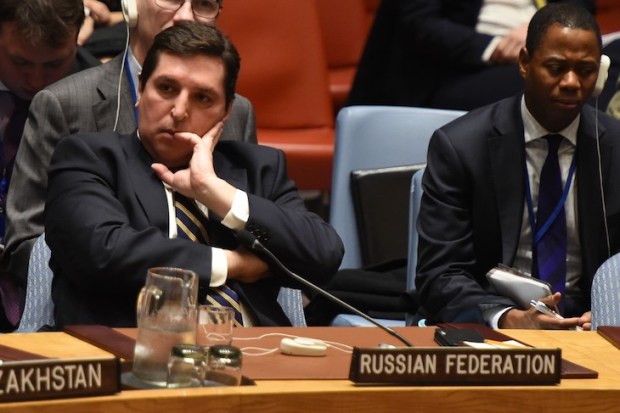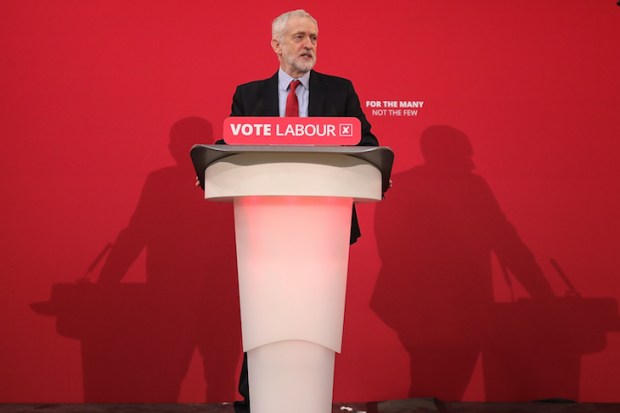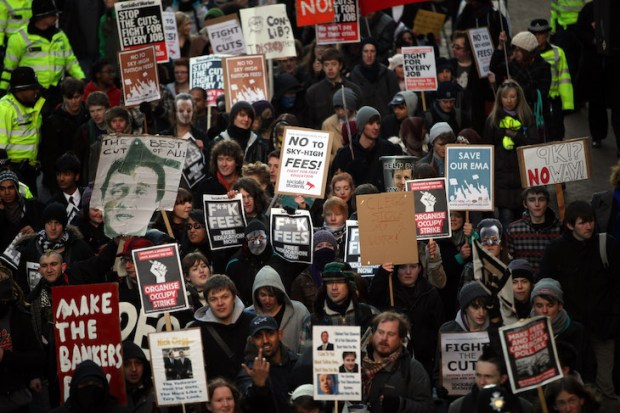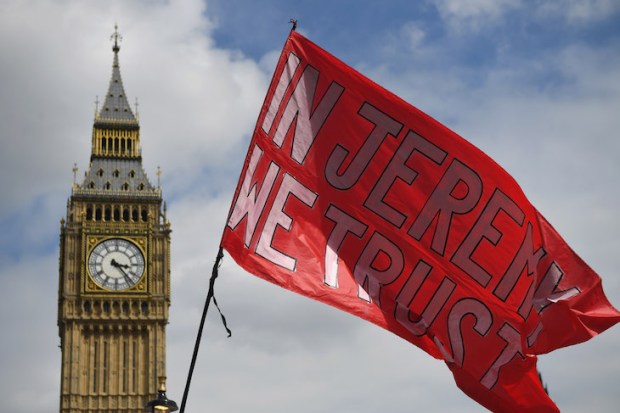Listen
It makes no sense for Britain to bomb Islamic State in Iraq but not Syria. Attacking a group that does not respect international borders on only one side of a border makes no strategic or military sense. From the Prime Minister down, government ministers are acutely aware of this absurdity. That is why they have been so keen to gain the Commons’ permission to extend the strikes to Syria.
Yet this week Westminster has been gripped, not by the strategic case for taking the fight to Islamic State in Syria, but by the effect that this debate has had on the Labour party. Unprecedented is an over-used word in political coverage; very few things are without precedent. But there really is no precedent for the Labour party’s current state.
It is far worse than Labour not having a position. Instead of having no policy, it has two policies — that of the leader and that of the shadow foreign secretary. Jeremy Corbyn is adamantly opposed to airstrikes and will make that case from the despatch box on Wednesday. But Hilary Benn is in favour and will make his argument from the same despatch box later in the debate. Even during the great Labour divide over Europe in the 1970s, Harold Wilson insisted that ministers speaking from the despatch box had to represent his position, even though cabinet collective responsibility had been suspended.
Almost no one in the Labour party is pretending that this is anything other than a shambles. The free vote and the opposing arguments being put from the same despatch box aren’t part of the fabled ‘new politics’ but a product of the fact that the leader and the shadow cabinet can’t agree.
If Corbyn had stuck to his anti-war guns and whipped Labour MPs against airstrikes, sacking those who rebelled, he couldn’t have filled his front bench. Only a handful of the shadow cabinet are loyal to him, and most would have walked out if he had tried to sack those who disagreed with him. Rosie Winterton, the Labour chief whip, isn’t Corbyn’s enforcer but the shadow cabinet’s shop steward. At her signal, it will be one out, all out.
But the shadow cabinet know that, however much they might want to, they can’t move against Corbyn because he has the support of party members: to bring him down would cause a Labour civil war. Polling suggests that Corbyn is now even more popular with the membership than he was when he won the leadership on the first ballot with nigh-on 60 per cent of the vote in a four-candidate field. The result is that Labour can’t function as an effective political party.
Straight after Corbyn became eader, even those who had opposed him most strongly acknowledged that it would take time to replace him. They conceded that they couldn’t move against him before those who had voted for him had begun to accept that his leadership wasn’t working. They also stressed that they needed time to find a candidate and to recruit new supporters. But the experience of having Corbyn as leader has caused even those who advocated patience to snap.
So, what’s the alternative? There are two distinct anti-Corbyn strategies being touted at the moment. The first is to make doing the job so difficult for him that he resigns. But there are no signs that Corbyn intends to walk away. Ever since party conference, he has been rather enjoying himself.
The other strategy is more high-risk. It is to force him out now and gamble that the party rulebook wouldn’t allow Corbyn to stand again unless he got the nominations of 35 MPs, which he would struggle to do. If this heist could be pulled off, the grassroots would scream blue murder. The leader they overwhelmingly elected would have been forced out in a parliamentary coup. But the advocates of this strategy say that there could be no alternative, because by the next conference the leadership will have fixed the rules so that Corbyn is automatically on the ballot and, with grassroots opinion the way it is, he would defeat any challenger.
There are no good options for Labour now. Forcing Corbyn out could split Labour, with his left-wing supporters either walking away from the party in disgust or setting up a new one of their own. But a year of his leadership could doom Labour to opposition for a decade or more. Polling suggests that the party has already lost the support of one in three of those who voted for it in May. The longer Corbyn continues, the worse this number will get.
As Labour demonstrated in the 1980s, it is very hard to kill one of the two major parties of British politics. But despite there not having been any defections yet, Labour’s position is even worse now that it was then. Two of the things that kept Labour sane in the eighties were the Scottish Labour party and moderate trade unions. These pillars of sanity have been greatly weakened. Scottish Labour is now a husk with only one MP, while moderate trade unionism is far less of a force today than it was then.
Hilary Benn is regarded by many in the Parliamentary Labour Party as the ideal stop-gap leader if Corbyn is deposed. But those looking around for a Labour-saving device have alighted on Dan Jarvis. Even those who as recently as May worried about his lack of policy knowledge and economic populism now believe that he is the right choice. Corbyn is doing daily damage to the Labour party’s reputation for patriotism and willingness to keep the country safe. Electing this former paratroop major would offer an immediate fix to this problem.
But Labour’s difficulties are about far more than its leader or even the split between its membership and its MPs. It still can’t agree on what its purpose is in an age of globalisation when government budgets are facing constant downward pressure. The evidence to date shows that Corbyn’s answer to these questions can’t put together an election-winning coalition. But the worry for Labour is that it might be impossible to put things right.
Got something to add? Join the discussion and comment below.
Get 10 issues for just $10
Subscribe to The Spectator Australia today for the next 10 magazine issues, plus full online access, for just $10.
You might disagree with half of it, but you’ll enjoy reading all of it. Try your first month for free, then just $2 a week for the remainder of your first year.















Comments
Don't miss out
Join the conversation with other Spectator Australia readers. Subscribe to leave a comment.
SUBSCRIBEAlready a subscriber? Log in